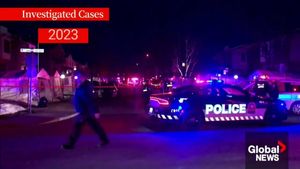Bangladesh is currently caught up in significant political unrest following the overthrow of former Prime Minister Sheikh Hasina by interim government chief Muhammad Yunus. Hasina, who fled to India after the August 5, 2024, uprising sparked by protests led by students, has leveled serious accusations against Yunus, accusing him of unleashing lawlessness and chaos upon the nation.
During recent virtual interactions held via social media with widows and families of police officers killed during the turbulent protests, Hasina asserted, "He (Yunus) dissolved all inquiry committees and unleashed terrorists to butcher people. They are destroying Bangladesh." These remarks reflect the deep-seated animosity and blame she attributes to Yunus for the catastrophic violence and corruption during his administration.
Hasina did not hold back, declaring, "I will return and avenge the deaths of our policemen," expressing her intent to reclaim her position and exact justice. She mentioned narrowly escaping death during her government’s ousting and attributed her survival to divine intervention, stating, "By the grace of God, I was kept alive to do something good." Such declarations suggest her undeterred readiness to engage politically and possibly militarily against the interim government, which she accuses of human rights violations unprecedented under his rule.
The urgent matter of Hasina's extradition from India has become a top priority for the interim administration. Press secretary Shafiqul Alam emphasized this point, declaring, "This is the government’s top priority. We will continue our efforts to extradite Hasina to hold her trial in person." The government’s insistence on Hasina’s return stems from pressing allegations leveled against her regime, including mass murders and enforced disappearances, particularly highlighted by the UN’s Office of the High Commissioner for Human Rights (OHCHR) which reported approximately 1,400 deaths during the protests.
Moving forward, it is clear Yunus’s interim government seeks to solidify its grip on power amid allegations of repressive governance. While the urgency of securing Hasina’s extradition remains palpable, the anguish resulting from mob violence during the protests is still painfully evident. Reports indicate at least 44 police officers have been killed, with 450 out of 639 police stations across Bangladesh reportedly being destroyed or damaged as violent mobs retaliated against supporters of Awami League.
This wave of revenge violence against Hasina’s party has not gone unnoticed. According to the recent OHCHR report, the rampant attacks primarily targeted Awami League leaders and their constituents, with minority groups such as Hindus suffering significant backlash. Destruction of Hasina’s ancestral home, which served not only as her residence but also as a museum honoring her father, Sheikh Mujibur Rahman, symbolizes the intent of opponents to erase her legacy.
Yunus, criticized for allegedly lacking governmental experience, previously called on India to intervene against Hasina, asserting, "Her remarks have inflamed tensions in Bangladesh." This public pressure on India, where Hasina now resides, reflects the complexity of international relations within the region and the growing chorus for action against the interim administration’s alleged authoritarian practices.
The question arises: is Bangladesh’s political environment becoming increasingly tenuous under its interim leader? Given Yunus's apparent consolidation of power and the stifling of dissent, many observers worry these tactics mirror the very autocracy the transitional government ostensibly sought to dismantle.
Human Rights Watch (HRW), in its evaluation of Yunus's government, expressed serious concerns over the continuing authoritarian drift since the regime change. Their reports have pressured both the interim government and India to facilitate meaningful electoral processes rather than elongate the current state of unrest.
The political climate remains fraught with tensions as both Hasina’s return and Yunus’s governance are under scrutiny. Civil rights activists and political parties, such as the Bangladesh Nationalist Party, have voiced their discontent with the perceived loss of freedoms under Yunus’s interim administration, characterizing it as hypocritical and authoritarian.
Social media has been abuzz with dialogues calling for democracy and justice, showcasing how intertwined these issues are with the aspirations of the Bangladeshi populace. With the interim government purporting to lead the country through a transitional phase, the question looms larger: will they uphold democratic values or revert to the historical patterns of oppression?
For many, the necessity of free and fair elections looms ever larger; securing these can not only restore the political stability Bangladesh desperately needs but also uphold the democratic principles promised by both the former and current regimes. The call for genuine governance and public accountability continues to resonate across Bangladesh, urging both citizens and leaders alike to reflect on the ideals of democracy they wish to pursue.



